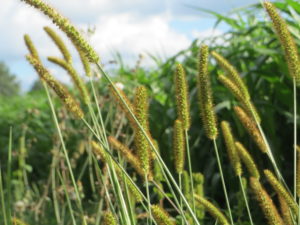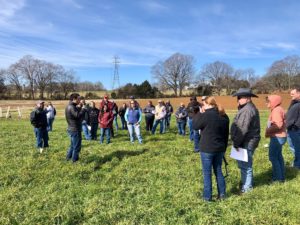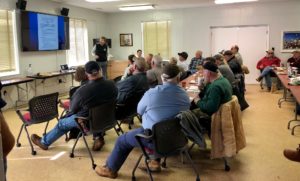Foxtail Is Taking Over My Hay Field. What Can I Do to Control This Weedy Grass?
go.ncsu.edu/readext?589203
en Español / em Português
El inglés es el idioma de control de esta página. En la medida en que haya algún conflicto entre la traducción al inglés y la traducción, el inglés prevalece.
Al hacer clic en el enlace de traducción se activa un servicio de traducción gratuito para convertir la página al español. Al igual que con cualquier traducción por Internet, la conversión no es sensible al contexto y puede que no traduzca el texto en su significado original. NC State Extension no garantiza la exactitud del texto traducido. Por favor, tenga en cuenta que algunas aplicaciones y/o servicios pueden no funcionar como se espera cuando se traducen.
Português
Inglês é o idioma de controle desta página. Na medida que haja algum conflito entre o texto original em Inglês e a tradução, o Inglês prevalece.
Ao clicar no link de tradução, um serviço gratuito de tradução será ativado para converter a página para o Português. Como em qualquer tradução pela internet, a conversão não é sensivel ao contexto e pode não ocorrer a tradução para o significado orginal. O serviço de Extensão da Carolina do Norte (NC State Extension) não garante a exatidão do texto traduzido. Por favor, observe que algumas funções ou serviços podem não funcionar como esperado após a tradução.
English
English is the controlling language of this page. To the extent there is any conflict between the English text and the translation, English controls.
Clicking on the translation link activates a free translation service to convert the page to Spanish. As with any Internet translation, the conversion is not context-sensitive and may not translate the text to its original meaning. NC State Extension does not guarantee the accuracy of the translated text. Please note that some applications and/or services may not function as expected when translated.
Collapse ▲Answer: Foxtail is an annual grass that germinates in the spring when soil temperature averages 65 degrees for three consecutive days. Alexander County soil temperature data from 2009 to 2018 shows 65°F three-day average soil temperature occurred between April 22 and May 9. This is why foxtail is typically a problem for the second hay cuttings.
In 2017, Prowl H2O was registered for use on established pastures and hay fields. Prowl is a preemergent herbicide. The active ingredient is pendimethalin. A preemergent herbicide is a great tool for controlling annual weeds, such as foxtail, prior to their germination.
For a preemergent herbicide to be effective, it must be applied before the weed germinates. Foxtail germinates between mid April and mid May in the western Piedmont of NC. Preemergent applications should be made by April 1 for consistent foxtail control.
Prowl H2O typically mixes well with liquid fertilizer as well as broadleaf pasture herbicides. The inclusion of broadleaf herbicide such as Weed Master, Grazon P+D, or Crossbow in the tank will control emerged broadleaf weeds. A compatibility test should be performed to confirm the fertilizer and or herbicide can be tank-mixed together.
Prowl H2O should not be applied to seedling fescue or seedling / newly sprigged bermudagrass. Besides foxtail, Prowl will also control other annuals such as crabgrass, goosegrass, fall panicum, and pigweed.
It is important to be aware of restrictions with Prowl. There is a grazing restriction of 60 days and a hay restriction of 45 days. These restrictions are the time between making the herbicide application and when the forage can be grazed or harvested.
For Prowl H2O to be effective, it must be rain activated within two days of application, however the sooner the better. Always read and follow the labeled directions before making a pesticide application.
In the western Piedmont of North Carolina foxtail will be one of three annual foxtail species. These annual foxtails are yellow foxtail, green foxtail, and giant foxtail. It is possible there may be knotroot foxtail (also called perennial foxtail) growing in the Piedmont of North Carolina. This weed is a problem in Georgia and Tennessee. Prowl will not control knotroot foxtail. Contact your local N.C. Cooperative Extension Agent if you have questions.
This brief came out as a result of the Forage Winter Training that took place at the Piedmont Research Station on 13 Feb. 2019.
Written by: Seth Naggy, County Director, N.C. Cooperative Extension, Caldwell County Center





